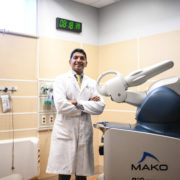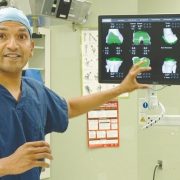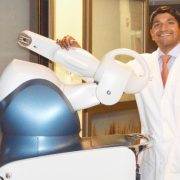PORTSMOUTH – Recent advancements in robotic technology will help patients achieve better results during total knee replacement, says a surgeon who is training his peers on new methods.
Dr. Akhil Sastry, of Atlantic Orthopaedics and Sports Medicine in Portsmouth, was one of the first surgeons to try the Mako Total Knee with Triathlon Knee System for Stryker, one of the largest developers and manufacturers of total knee replacement systems in the world. When the company began selling their newest technology for total knee replacements last year, Sastry started teaching surgeons in the United States and around the globe how to use it.
“Now, 5,000 robotic assisted total knees have been performed by over 200 surgeons worldwide. The projected number of surgeons will be almost 1,000 by the end of next year,” Sastry said.
Sastry trained the first surgeon to use the technology in Germany, and during the last week of September, he will be traveling to India to teach surgeons there how the newest Mako robot works.
The concept of robotics being used in knee surgery has been around since 2006, but patients still have only a 75- to 80-percent satisfaction rating post-operation, Sastry said. He believes the latest technology will improve that because surgeons can take into account a knee’s complete range of motion when planning and performing their procedures.
“We can fine-tune the positioning of the implants to not only take account for the static positioning of the knee, but the dynamic position of the knee,” Sastry said. “So, it creates a perfect plan each and every time.”
Sastry performs total knee replacements at Portsmouth Regional Hospital and York Hospital in Maine.
In Laconia, surgeon Arnold Miller says he is using the newest Mako robot for total knee replacements. Miller started using robotics five years ago for partial knee replacements and hip replacements.
“I have been impressed with the results, and patients seem very happy with their outcomes,” Miller said.
Miller works at the Laconia Clinic, and performs total knee replacements at Lakes Region General Hospital in Laconia.
Dr. Jeremy Hogan also uses Mako robots during his surgeries at Lakes Region General Hospital. He works at Advanced Orthopaedic Specialists in Gilford.
Hogan was first exposed to Mako robots seven years ago. He says he has been using them at the hospital for five years.
Hogan says using robots has enhanced his accuracy.
“I can measure single degrees and millimeters, which is super human, and the robot assist ensures that I carry out my patient specific plan precisely,” Hogan said. “The goal is always a ’forgotten joint’ where the patient does not notice the presence of a replacement. A patient that had a traditional total knee by me a few years ago and recently underwent a robot assisted total knee feels that the rehab process is easier this time.”
In a video created for the Mako Total Knee with Triathlon Knee System, Stryker’s Chief Executive Officer Kevin Lobo says the new technology is a great example of modern collaboration and innovation.
“The health care landscape is consistently evolving. Stryker is committed to partnering with our customers to bring innovative solutions for our patients,” Lobo said.
Stryker’s global headquarters are located in Kalamazoo, Mich.
Experts project that total knee replacements in the United States are expected to increase 673 percent by 2030.
Article seen in the New Hampshire Union Leader.



